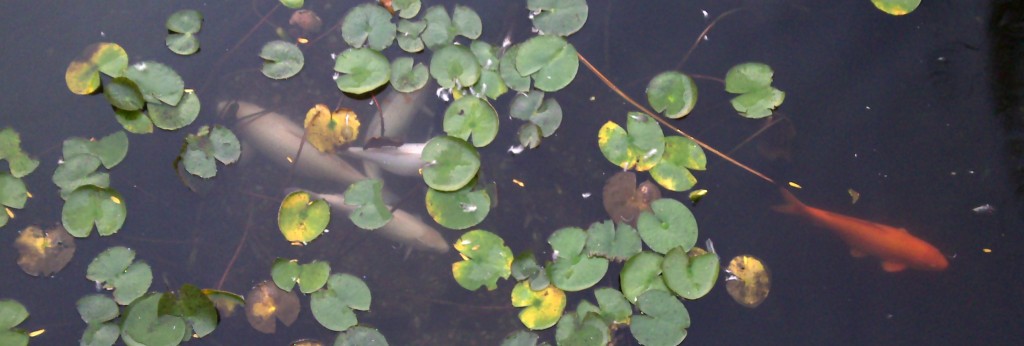This post has been read 3935 times!
One of the best assets in Battery Park City for children and visitors has been the unique and highly prized collection of large Koi fish in the waterfall pond by the Irish Hunger Memorial. The fish have been living in the waterfall pond for many years. Some grew to be 24 inches long. Koi can cost thousands of dollars if they were to be purchased fully grown.
Most residents are surprised to learn that the fish stay in the pond throughout the winter and somehow live through the cold and ice. Not this year. All of the large Koi have died. The country suffered through one of the worst winters on record and the thick ice over the pond likely depleted the water of oxygen as it froze thicker than usual.
It is common knowledge to most people that fish in ponds need to have the ice broken in order to oxygenate the water. How did the Battery Parks Conservancy experts miss this and fail to take proper action to ensure the viability of these expensive cherished fish?
BatteryPark.TV called the Parks Conservancy office dozens of times over two days and were told that the official we were trying to reach was either “Not in his office” or “Not in the building”. Upon going in person to the offices located on Battery Place, the official in question was in fact sitting at his desk. He declined to comment on the matter. Tess Huxley, the senior most official of the Battery Parks Conservancy, has previously not replied to any of our emails or calls. Officials from the Battery Park City Authority also declined to comment in time for this article.
In the past, the Ms. Huxley has taken a hands-off, let-nature-take-its-course, approach to the wildlife in the parks. The ten ducklings that grew last year in the same pond, matured into adults, and flew away did so only after BatteryPark.TV gained the volunteer cooperation of others to supply square boards to avoid drowning and feed for the birds until they could fly out of the contained pond. The year prior in 2009, all but two ducklings starved to death without this type of assistance.
Sources told BatteryPark.TV that the Koi in the pond that died this winter had been there for 16 years. The Parks staff have never proactively cared for the fish in the winter. This winter was different, and they all died.



That’s really awful. These fish can live up to an average age of 60 years or more. The world’s oldest koi fish, Hanako, died on July 17, 1977, at the age of 226. There are about eight new and smallish orange Koi fish in that pond now and was wondering why.
After the Hurricane Irene evacuation, the koi was the highlight on my way back while walking home (I just evacuated to the outer edge of the hurricane zone). I hope this winter there’s more proactive koi care!